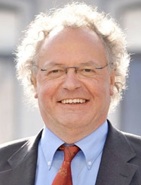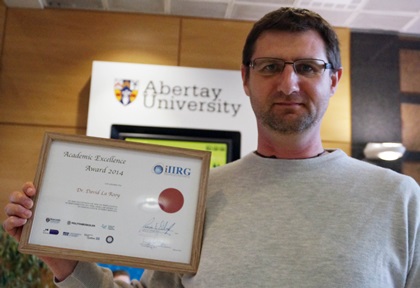iIIRG Awards
Each year, the iIIRG awards its members at any point in their academic or practitioner career who have produced work of outstanding quality or have done something extraordinary for the benefit of investigative interviewing. The awards take place at our International Annual Conferences and include:
- The iIIRG Tom Williamson Award (can occasionally be awarded to a non-member)
- Practitioner Excellence Award
- Academic Excellence Award
Further details of each award can be found below. All members are encouraged to nominate someone who has produced work of outstanding quality or have done something extraordinary for the benefit of investigative interviewing.
The iIIRG Tom Williamson Award
This highly prestigious award is reserved for an individual who has made a significant contribution to investigative interviewing either nationally or internationally. The award will be given to the person who, during his or her career, has distinguished themselves in an exceptional way by their work, practice or teaching, which complies with the mission pursued by the International Investigative Interviewing Research Group (iIIRG) – the promotion of best practice in investigative interviewing (the search for truth) and in the respect of fundamental human rights.
This award will be determined by the iIIRG membership, through its Executive and Scientific Committees, and nominations should include the following information:
- The way/s in which the candidate has distinguished themselves in an outstanding way by their work, practice or teaching which complies with the iIIRG mission;
- The proposer must provide a short write-up of the candidate (no more than 500 words) and a summary of his or her main achievements which should show they are in line with the iIIRG mission;
- All nominations must be submitted by an iIIRG member and the recipient must also be an iIIRG member. The list of finalists will be voted for by the iIIRG Executive and Scientific Committees. The result of this vote will be publicly unveiled at the iIIRG Annual Conference;
- More than one person can simultaneously receive this award, but only in exceptional circumstances.
- The award may not be awarded each year.
Practitioner and Academic Excellence Awards
These awards will be determined by the iIIRG membership, through its Executive and Scientific Committees, and nominations should include the following information:
- Name of the nominee;
- Name of proposer/s;
- Details of their research or practice;
- A covering letter which clearly identifies the particular merit of the work and to receive such an award.
To nominate someone for one of the awards, please contact Genevieve Waterhouse (g.waterhouse@iiirg.org) or Gary Pankhurst (g.pankhurst@iiirg.org) with your nomination by 18th June 2022.
Student Awards
Awards and funding are also given to students to encourage participation at iIIRG events. The iIIRG understands the importance of recognising students’ hard work and encourages all of its student members to apply for prizes at the Annual Conferences.
- PhD Student Bursary Scheme: The iIIRG offers a small number of bursaries to PhD students who wish to attend the iIIRG Annual Conference. This is a brilliant opportunity to receive financial support in order to enable you to attend the event at a much lower cost. We encourage early applications as these bursaries are very popular!
- Poster Award (for posters being presented at the conference): This award is given to the best poster presented by a student at the iIIRG Annual Conference. The posters are judged by members of the iIIRG Executive Committee. This is another great opportunity to have your hard work recognised within the group.
- Paper Award: This is given to the best student presentation at the iIIRG Annual Conference. The presentations are judged by members of the iIIRG Scientific Committee. This is a fantastic opportunity to demonstrate your presentation skills and be recognised for these skills. Often, oral presentations are seen as being a less enjoyable aspect of academic work and therefore receiving a prize in acknowledgement of a high-quality presentation may ease the process for future presentations.
- Article Award: The iIIRG-S presents this award to the best student article submitted to the iIIRG Journal. The winning article is published in the Journal and this is therefore an ideal opportunity for students to have their work read by both academics and practitioners within the field.
Previous Award Winners
2021 (iIIRG Virtual)
Student Awards
- Best Student Presentation: Chris Lively (“’You have the right to remain silent and watch a cartoon’: Exploring the multimedia principle’s applicability for improving comprehension of youth interrogation rights” – Memorial University of Newfoundland)
- Two Highly Commended runner ups: Cody Porter (“A critical analysis of the Model Statement literature: Should this tool be used in practice?” – University of Portsmouth) and Jana Otzipka (“Assessing the individual interviewer rapport-building and supportive techniques of the R-NICHD protocol” – Freie Universität Berlin)
2018 (Porto, Portugal)
iIIRG Tom Williamson Award
The iIIRG Tom Williamson Award was presented to Dr Philip Esplin who has conducted numerous National and International training seminars worldwide on proper interview/investigative techniques in child molestation cases. He has testified in over 500 court matters involving children and adolescents and has consulted and/or testified in a number of major sex abuse cases including: (i) State of Florida v. Bobby Finji ; (ii) The “Little Rascals” daycare case in North Carolina; (iii) The Dale Akkiki case in San Diego; (iv) The Wenatchee case in Wenatchee, Washington, and; (v) The Michael Jackson case in California. In short, Dr Esplin has been an extensive carer dedicated to the research and practice of child interviewing and Forensic Psychology.
Academic and Practitioner Excellence Awards
The Academic Excellence Award was presented to Dr Sonja Brubacher for her work on conducting experimental research on topics relevant to the forensic interviewing of children. She has extensively examined issues around the use of practice interviews, retrieval of information for repeated events, and how children can better remember specific experiences. Her experimental research continues to this day and informs many aspects of the practice of forensic interviewing. Sonja and also demonstrated excellence in the breadth of research that she has undertaken during her career thus far. Her work on interviewing practices, analysis of forensic interviews, questioning styles, and publication of case studies continues to significantly inform our field.
The Practitioner Excellence Award was presented to Staff Sergeant Greg Yanicki who has been central to the development and implementation of the Phased Interview Model (PIM). As a long-term member of the iIIRG, Greg understands the value of rapport-based approaches to interviewing and expertly implements them in his own suspect and witness interviews, thus leading his team by example in the process. As evidence-based approaches to interviewing that recognize the centrality of rapport and the goal of information-gathering take hold across the globe, these models must adapt to the cultural and legal traditions where they are implemented.
Student Awards
Charlotte Hudson’s research was entitled: ‘You know it takes two: Understanding variance in interviewer and witness performance’.
Gary Dalton’s research was entitled: ‘999, what’s your emergency? An examination of frontline emergency communication in fire and rescue services control rooms’.

2017 (California, USA)
iIIRG Tom Williamson Award
The iIIRG Tom Williamson Award was presented to Professor Gisli Gudjonsson, Kings College London. He is viewed as having developed forensic psychology as a scientific discipline and his work, including his testimony in landmark cases in Britain and abroad, has significantly enhanced legal practice regarding human rights of the accused, police training and confession evidence. He is internationally recognised for his pioneering research into the measurement and application of interrogative suggestibility, psychological vulnerabilities and false confessions, which has stimulated extensive research and been applied to forensic and legal practice worldwide.
Academic and Practitioner Excellence Awards
The Academic Excellence Award was presented to Professor Richard Leo who is renowned in multiple academic disciplines for his pathbreaking conceptual and empirical research on the social psychology of police interrogation, the phenomena of false confessions, and the causes and consequences of the wrongful conviction of the innocent in the American criminal justice system. Professor Leo has received numerous career/lifetime achievement awards and his work has been cited hundreds of times in print and electronic media – as one measure of impact, his articles have been downloaded more than 36,000 times on the Social Science Research Network.
The Practitioner Excellence Award was presented to Mr Mark Fallon who is a tenacious advocate for lawful, effective and humane interrogation techniques. He has made numerous representations to representatives of the US Government and presented on Capitol Hill opposing torture. Mark is an enthusiastic supporter of researchers in the field of investigative interviewing and consistently argues for the use of evidence-based research to inform and improve the practice of interrogation to better protect national security and public safety.
Student Awards
Francesco Pompedda’s research was entitled: ‘Improving investigative interviews in alleged CSA cases. Simulated investigative interviews with avatars as solution of some practical problems’.

David Mount’s work was entitled: ‘Transfer & Application of Investigative Interviewing Core Skills: A Case Study’.

2016 (London, UK)
iIIRG Tom Williamson Award
Academic and Practitioner Excellence Awards
 Dr Chris E. Kelly, USA (Academic)
Dr Chris E. Kelly, USA (Academic)
Alistair Graham, International Criminal Court (Practitioner)
Student Awards
Annina Heini won the poster prize for her research: ‘A Comparative Study of Police Investigative Interviews with 17 and 18 Year Old Suspects’.

Tanja van Veldhuizen won the prize for best research entitled: ‘Where are you from? Questions Asked by the Dutch Immigration Service to Assess Credibility of Claims about Origin’.

2015 (Deakin, Australia)
iIIRG Tom Williamson Award
Professor Martine Powell, Australia
Academic and Practitioner Excellence Awards
Dr Emily Henderson, New Zealand (Academic)
Cameron Gardner (Practitioner)
2014 (Lausanne, Switzerland)
iIIRG Tom Williamson Award
Professor Peter van Koppen, The Netherlands
Academic and Practitioner Excellence Awards
Dr David La Rooy, Scotland, UK (Academic)
Dr Nina Westera, Australia (Practitioner)
2013 (Maastricht, The Netherlands)
Inaugural ‘iIIRG Tom Williamson Award’ (previously ‘Senior Academic Award’)
Professor Michael Lamb, UK
Academic and Practitioner Excellence Awards
Professor Chris Meissner, USA (Academic)
Colonel Steve Kleinman, USA (Practitioner)
2012 (Canada)
Academic and Practitioner Excellence Awards
Dr. Julia Korkman, Finland (Academic)
(from left to right): Mr. Steve Retford, Detective Sergeant Mick Confrey, Mr. Ian Hynes, Greater Manchester Police, UK (Practitioner)
2011 (Dundee, Scotland)
Senior Academic Awards (now ‘The iIIRG Tom Williamson Award’)
Distinguished Professor Saul Kassin, USA
Professor Ron Fisher, USA
Academic and Practitioner Excellence Awards
Dr. Fiona Gabbert, UK (Academic)
Ole Thomas Bjerknes, Norwegian Police (Practitioner)
2010 (Stavern, Norway)
Senior Academic and Practitioner Awards
Professor Günter Köhnken, Germany (Academic)
Detective Superintendent Andy Griffiths PhD, UK (Practitioner)
2009 (Middlesbrough, UK)
Senior Academic and Practitioner Awards (now ‘The iIIRG Tom Williamson Award’)
 Professor Ray Bull, UK (Academic)
Professor Ray Bull, UK (Academic)
Mr. Gary Shaw MBE, UK (Practitioner)
Junior Academic and Practitioner Awards
Dr. Coral Dando, UK (Academic)
Inspector Marlene Prenzler, Australia (Practitioner)


















